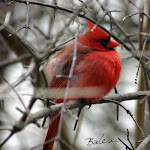
Rose-breasted grosbeaks have been passing through the Tennessee Valley migrating north to their breeding grounds. Much to my good fortune, several have stopped by my feeder in the past few days.
John James Audubon wrote about an encounter he had with one at night while camping on the Mohawk River in the early 1800s.
“The evening was calm and beautiful, the sky sparkled with stars, which were reflected by the smooth waters, and the deep shade of the rocks and trees of the opposite shore fell on the bosom of the stream…
“I closed my eyes, and was passing away into the world of dreaming existence, when suddenly there burst on my soul the serenade of the Rose-breasted bird, so rich, so mellow, so loud in the stillness of the night, that sleep fled from my eyelids. Never did I enjoy music more: it thrilled through my heart, and surrounded me with an atmosphere of bliss.”
-Photo by John Harrison
•



































































6 comments:
Nice Post.. Temp crossed 110 today in Delhi.
Lyn,
I love your blog--it's a quiet green oasis.
And I have a question for you--why do birds sing so loudly right as the sun is rising? I guess I'm noticing because all our windows are open right now. It is seriously loud at about 6:10AM.
So . . . what gives?
Your fan,
500Jerk
Aby.
110 degrees! That is hot. I've never been in temps that hot. I imagine you have gotten used to it. But, I think that would melt me. I have a low melting point like a candle.
Hello 500jerk. (I still love the origin of that name!)
Most songbirds are early risers. After sleeping through the night, they get up early to eat. They are hungry. This time of the year, they also have other things on their mind: raising a family.
The males are the singers and they sing to attract a mate and to claim a territory, which they defend from all rivals. A territory varies in size with the species' requirements. It could be your entire backyard, or just a single tree inside it.
A male robin will move about his territory and sing from place to place as if to say, this is my space, if you are another male robin, keep out! If he has not yet found a mate, there is more at stake. He's hoping some passing female robin takes note, listens to his song, judges his "savoir faire," looks over his territory and thinks, "This is my guy."
To which, he sings even more. Oh, happy day.
Lyn,
But why the extra singing in the AM? Fear that some other bird has encroached on their territory during the night? By 7AM or so, the singing has lessened considerably. It's interesting.
500Jerk
Hello again 500jerk.
Birds just get up early. The term "the early bird gets the worm" is very accurate. They tend to be most active the first few hours of the day, slow down during mid-day and have a final burst of energy in late afternoon, settling into their roosts at night, although at this time of the year, mockingbirds and a few others will even sing at night.There was a robin outside my bedroom window singing his little heart out the other morning and it was still quite dark outside.
After nesting season, it all settles down again and returns to normal. Whatever normal is.
Thanks for visiting.
Post a Comment